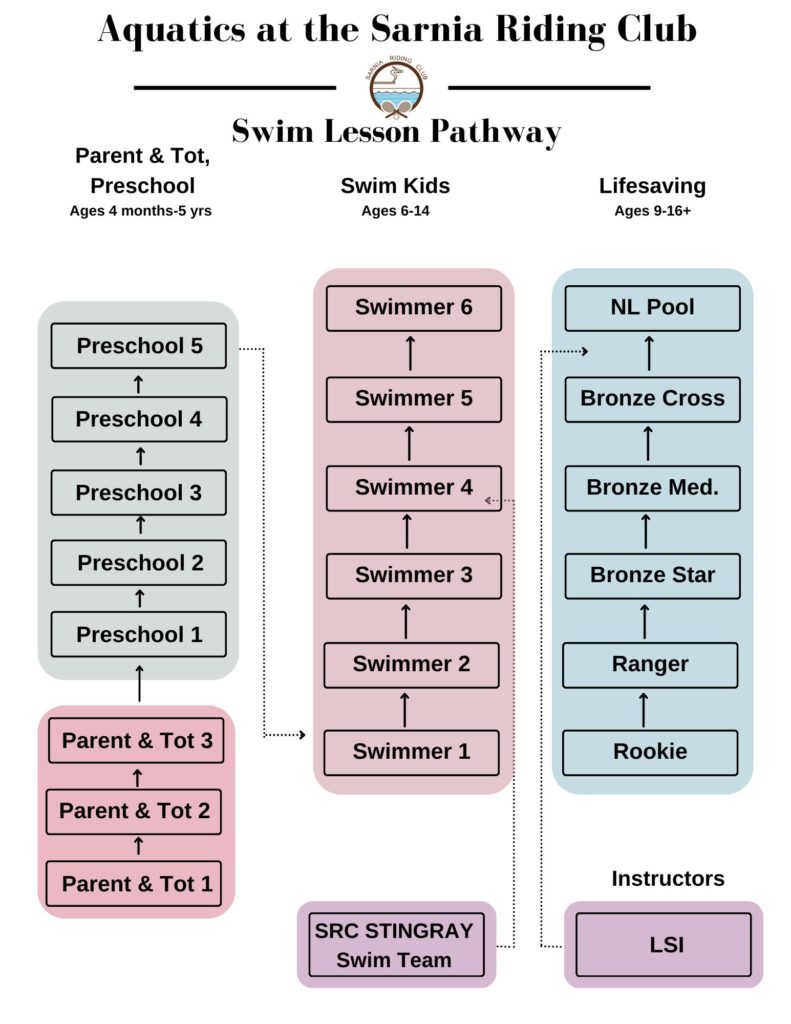Once a Week, All Summer Long
Our swimming lessons are only for members – the class sizes are very small and personal, with exceptional guards on staff.

Preschool
Give your child a head start on learning to swim. The Lifesaving Society Preschool program develops an appreciation and healthy respect for the water before these kids get in too deep.
In our basic aquatic progressions we work to ensure 3 to 5-year olds become comfortable in the water and have fun acquiring and developing a foundation of water skills. We incorporate Lifesaving Society Water Smart® education in all Preschool levels.
Unsure of your level? Check this helpful guide: Lifesaving Society Preschool Swim Program at a Glance
Swimmer 1-6
The Lifesaving Society’s 6-level Swimmer program makes sure your children learn how to swim before they get in too deep. Swimmer progressions accommodate children 5 years and older including absolute beginners as well as swimmers who want to build on the basics.
We stress lots of in-water practice to develop solid swimming strokes and skills. We incorporate Water Smart® education in all levels.
Unsure of your level? Check this helpful guide: Lifesaving Society Swimmer Program at a Glance
Rookie, Ranger, Star
Rookie Patrol (8-10 hr.): Swimmers continue stroke development with 50 m swims of front crawl, back crawl and breaststroke. Lifesaving Sport skills include a 25 m obstacle swim and 15 m object carry. First aid focuses on assessment of conscious victims, contacting EMS and treatment for bleeding. Fitness improves in 350 m workouts and 100 m timed swims.
Ranger Patrol (8-10 hr.): Swimmers develop better strokes over 75 m swims of each stroke. They tackle Lifesaving Sport skills in a lifesaving medley, timed object support and rescue with a buoyant aid. First aid focuses on assessment of unconscious victims, treatment of victims in shock and obstructed airway procedures. Skill drills develop a strong lifesaving foundation.
Bronze Courses
Bronze Star (8-10 hr.): Swimmers are challenged with 600 m workouts, 300 m timed swims and a 25 m object carry. Strokes are refined over 100 m swims. First aid focuses on treatment of bone or joint injuries and respiratory emergencies including asthma and allergic reactions. Lifesaving skills include defence methods, victim removals and rolling over and supporting a victim face up in shallow water.
Bronze Medallion (18-20 hr.): teaches an understanding of the lifesaving principles embodied in the 4 components of water-rescue education – judgment, knowledge, skill and fitness. Rescuers learn tows and carries, and defence methods and releases in preparation for challenging rescues of increased risk involving conscious and unconscious victims of various types. Lifesavers develop stroke efficiency and endurance in a 500 m timed swim.
Bronze Cross (18-20 hr.): Designed for lifesavers who want the challenge of more advanced training including an introduction to safe supervision in aquatic facilities. Bronze Cross is a prerequisite for all advanced training programs including National Lifeguard and Instructor certificate.
NLS
National Lifeguard certification is Canada’s professional lifeguard standard. National Lifeguard training develops a sound understanding of lifeguarding principles, good judgment, and a mature and responsible attitude towards the lifeguard’s role. National Lifeguard training emphasizes prevention and effective rescue response in emergencies including first aid treatment. Candidates develop teamwork, leadership and communication skills. Fitness requirements include a timed object recovery, 50 m sprint challenge, 50 m rescue drill and 400 m endurance challenge.
Prerequisites: minimum 16 years of age, Bronze Cross and Standard First Aid (need not be current) from one of: Lifesaving Society, St. John Ambulance, Canadian Red Cross, Canadian Ski Patrol.
